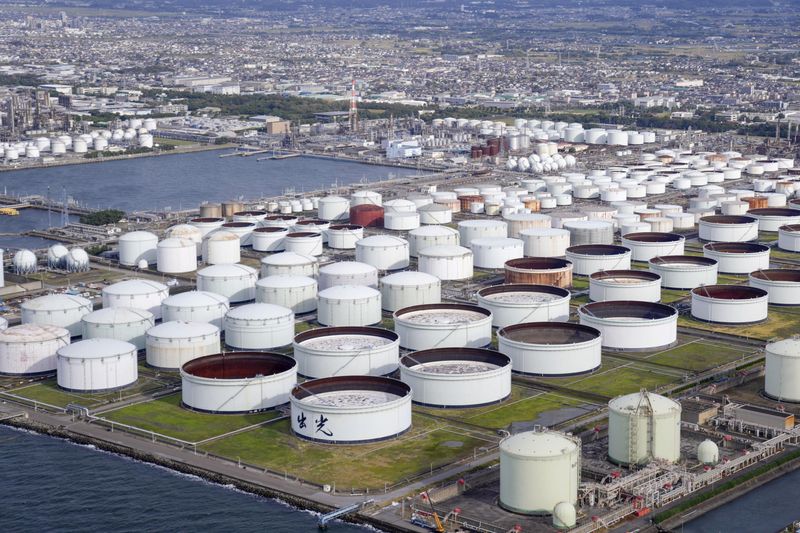By Scott DiSavino
NEW YORK (Reuters) -Oil prices climbed about 2% to a four-month high on Monday on lower crude exports from Iraq and Saudi Arabia and signs of stronger demand and economic growth in China and the U.S.
Brent futures rose $1.55, or 1.8%, to settle at $86.89 a barrel, while U.S. West Texas Intermediate (WTI) crude rose $1.68, or 2.1%, to settle at $82.72.
That pushed both benchmarks into technically overbought territory with Brent closing at its highest since Oct. 31 and WTI closing at its highest since Oct. 27.
In other energy markets, U.S. gasoline futures closed at their highest since Aug. 31.
On the supply side, Iraq, OPEC's second-largest producer, said it would reduce crude exports to 3.3 million barrels per day (bpd) in coming months to compensate for exceeding its OPEC+ quota since January, a pledge that would cut shipments by 130,000 bpd from last month.
In January and February, Iraq pumped significantly more oil than an output target established in January when several members of the Organization of the Petroleum Exporting Countries (OPEC) and allies like Russia, a group known as OPEC+, agreed to support the market.
In Saudi Arabia, OPEC's largest producer, crude exports fell for a second straight month, down to 6.297 million bpd in January from 6.308 million bpd in December.
In Russia, meanwhile, Ukrainian attacks on energy infrastructure have idled around 7% of refining capacity in the first quarter, according to a Reuters analysis.
Market participants said refinery outages will push Russia to increase oil exports through its western ports in March by almost 200,000 bpd to around 2.15 million bpd.
In the U.S., meanwhile, oil output from top shale-producing regions will rise in April to the highest level in four months, according to a federal energy outlook.
SIGNS OF GROWING DEMAND
In China, the world's biggest oil importer, factory output and retail sales beat expectations in the January-February period, marking a solid start for 2024 and offering some relief to policymakers even as weakness in the property sector remains a drag on the economy and confidence.
"Crude oil is up ... today. With demand for crude from China continuing to be a dominant factor," analysts at energy consulting firm Gelber and Associates said in a note.
China's crude oil throughput in January and February rose 3% compared to the same two months a year earlier as refineries raised production to meet strong demand for transport fuels over the busy Lunar New Year travel period.
In the world's biggest economy, the U.S. Federal Reserve (Fed) is widely expected to keep interest rates unchanged when it ends its latest two-day policy meeting on Wednesday.
Stronger-than-expected U.S. economic growth and stickier inflation this year have led investors to push back expectations on the Fed's first rate cut to June, from May, and reduce bets on how many cuts are likely this year.
Lower interest rates would reduce the cost of buying goods and services, which could boost economic growth and increase oil demand.

In a move expected to boost oil demand, U.S. Energy Secretary Jennifer Granholm said crude oil stockpiles in the Strategic Petroleum Reserve (SPR) at year-end will be at or exceeding the level that would have existed prior to massive sales two years ago.
In other U.S. news expected to boost oil demand, BP (NYSE:BP)'s 435,000 bpd Whiting, Indiana, refinery has returned to normal operations for the first time since a February power outage.